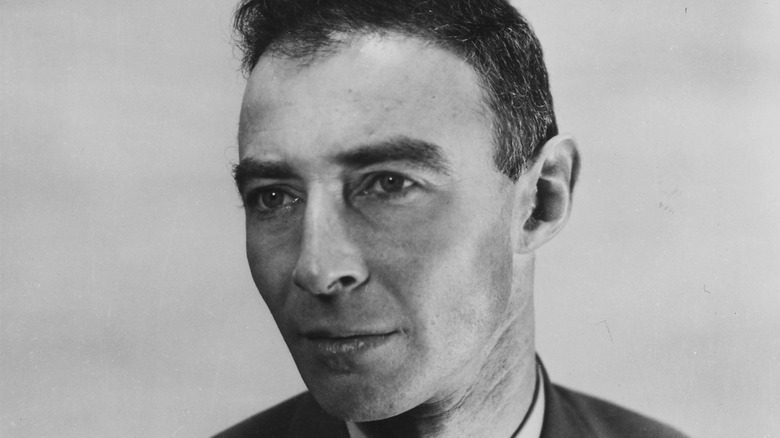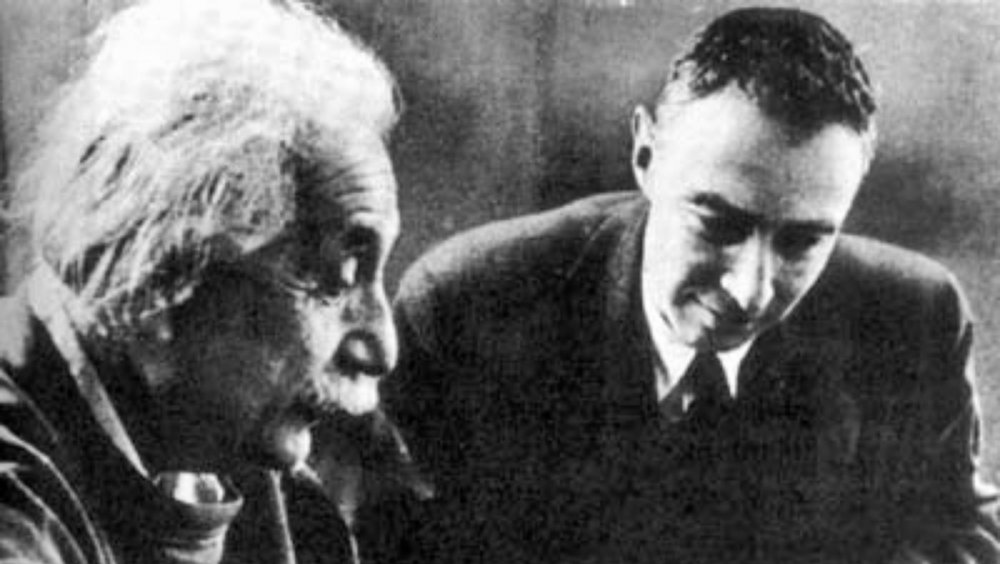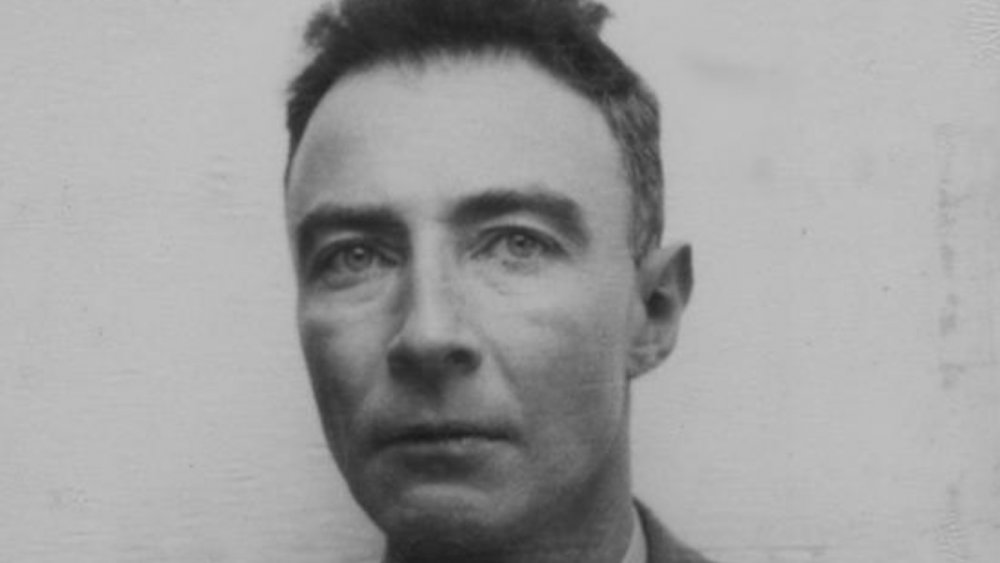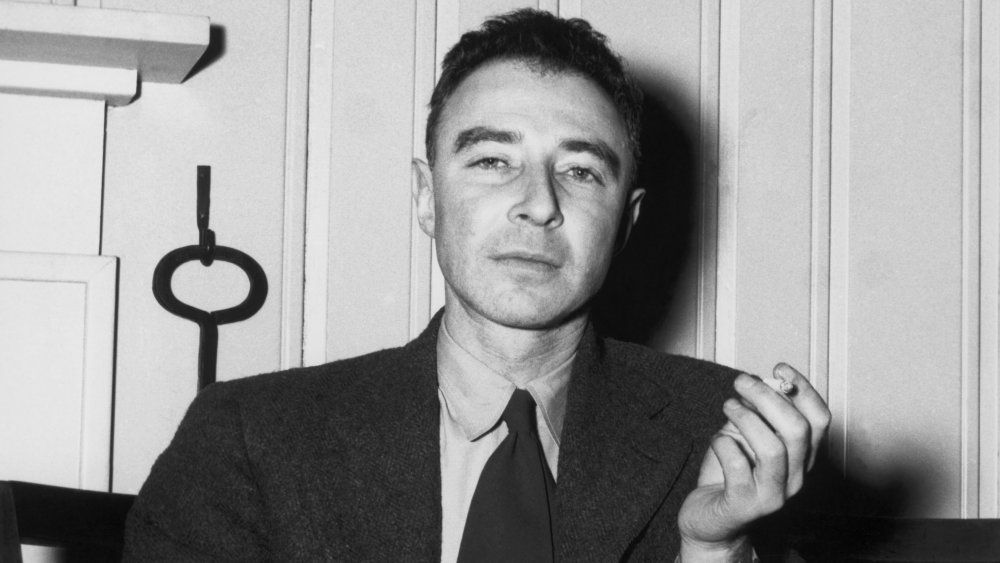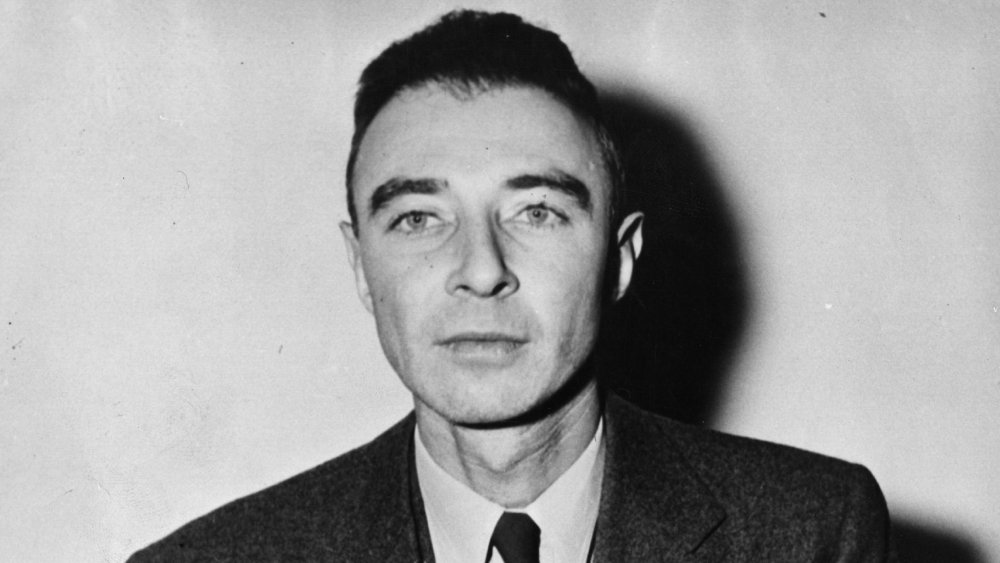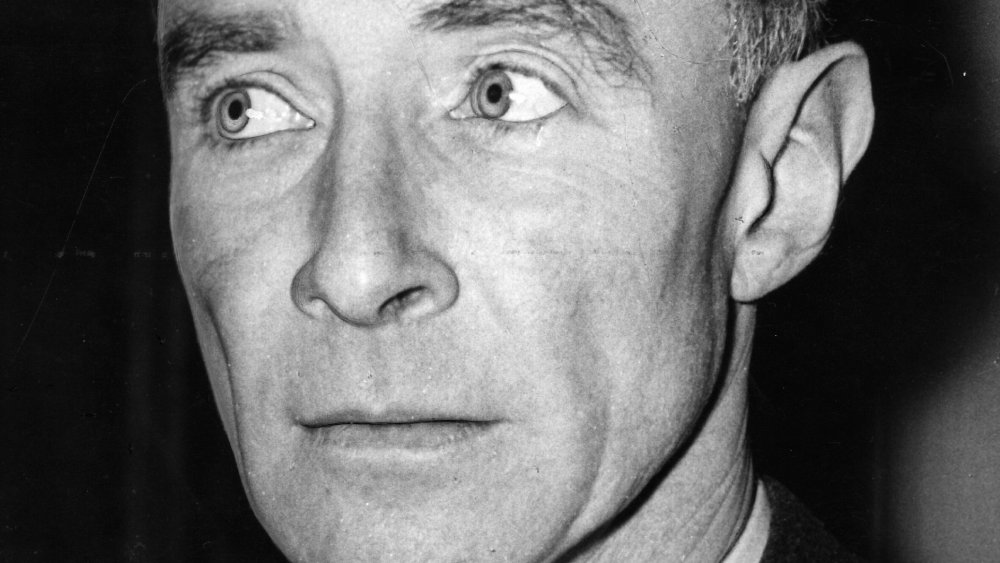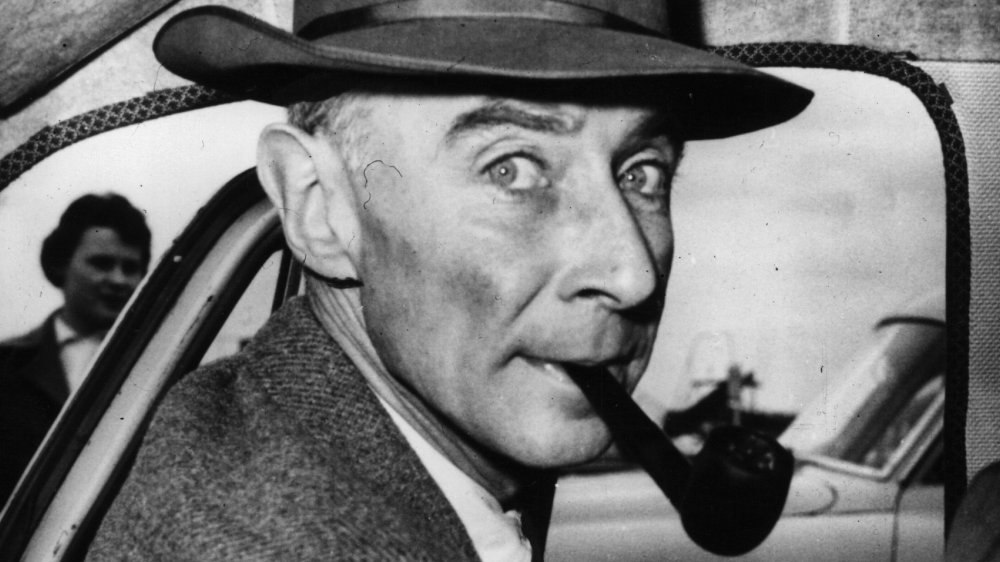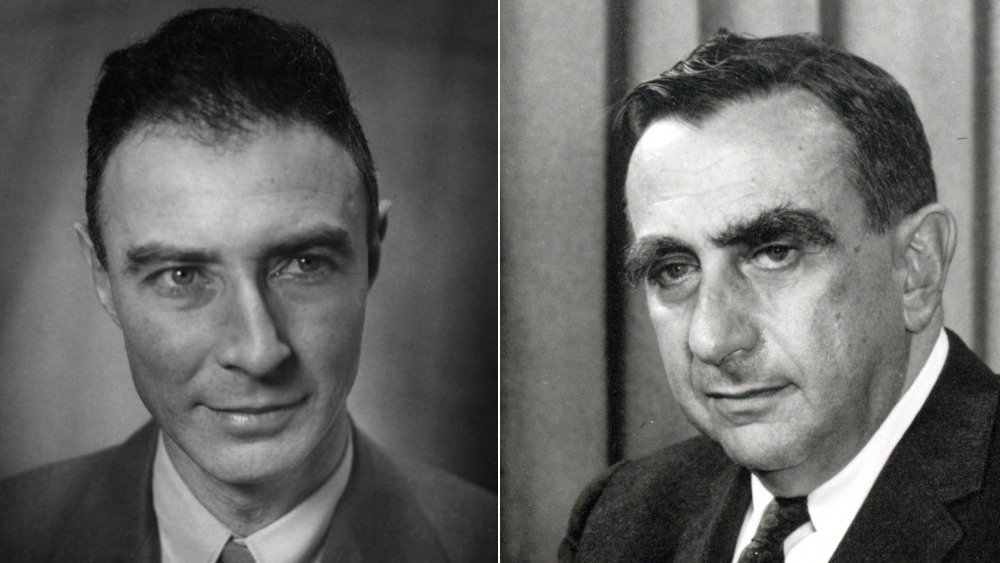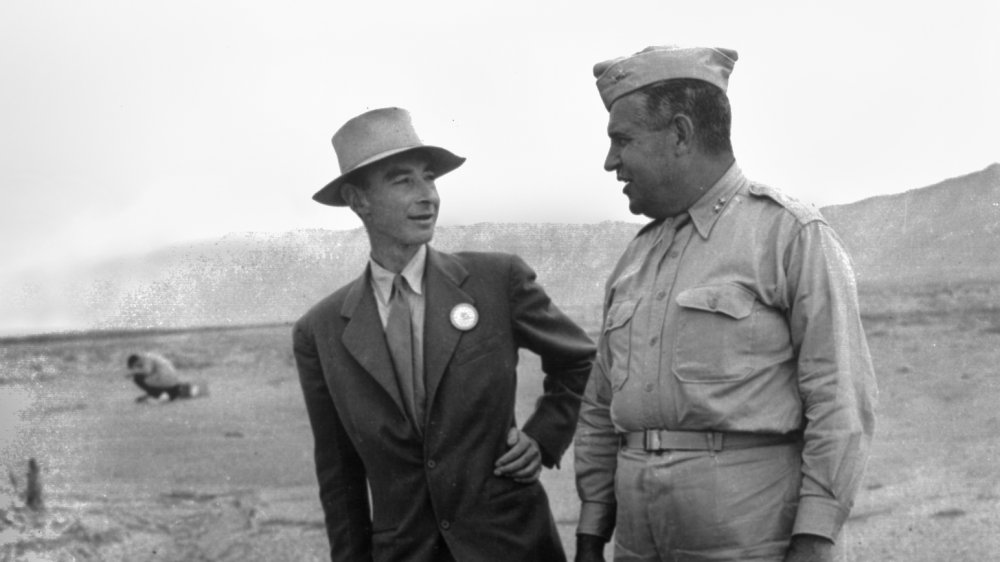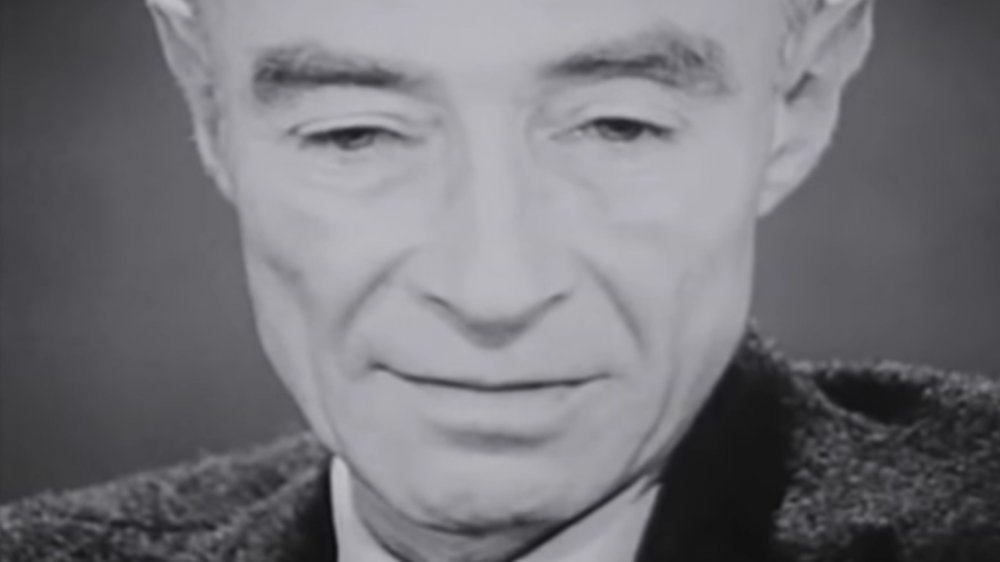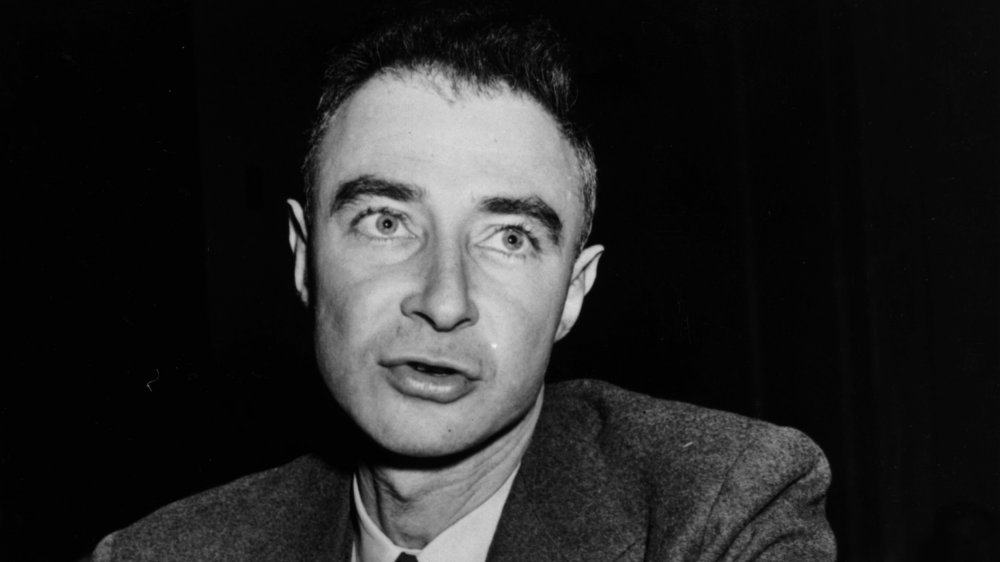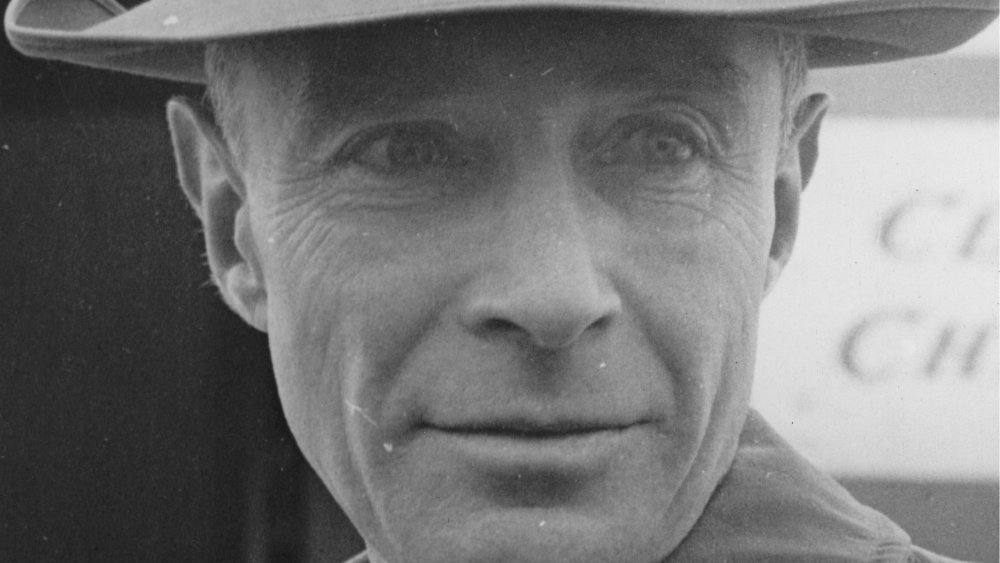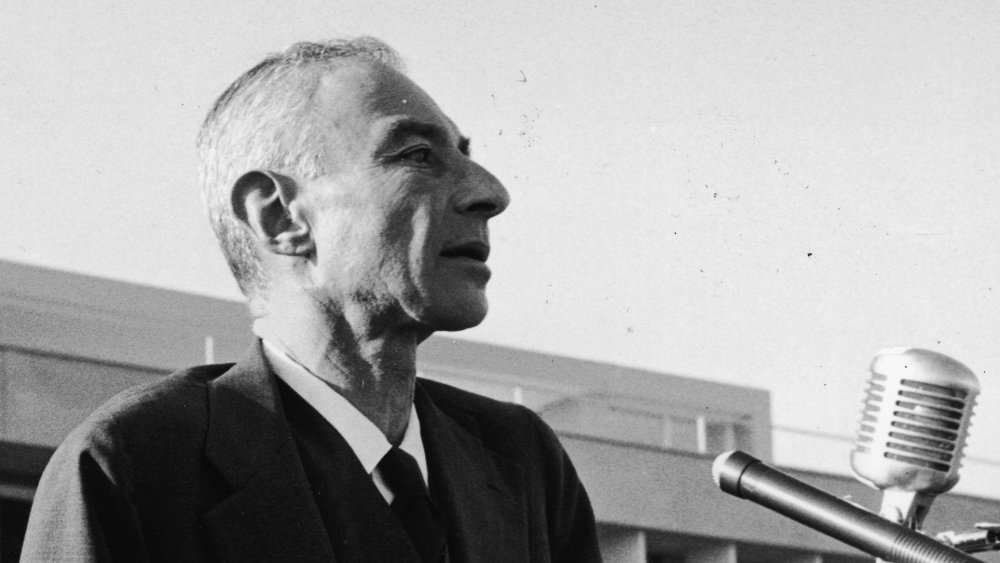The Grim Life Of The Man Who Created The Atomic Bomb
Julius Robert Oppenheimer "was no Einstein," writes Issues in Science and Technology. Technically, he was Albert Einstein's boss. In 1947, Oppenheimer became director of the Institute for Advanced Study, where the father of relativity worked as a resident scholar, per the Smithsonian National Portrait Gallery. While he didn't have Einstein's brain, Oppenheimer must have seemed like a no-brainer for the position after leading the Manhattan Project that produced the atomic bomb — a pursuit inspired by none other than Einstein.
Before the Manhattan Project, Oppenheimer had never occupied a major leadership role, and most of his friends didn't consider him fit to "run a hamburger stand," according to historian Martin Sherwin. He could be socially inept and self-destructive and had a history of mental instability. Yet he proved to be a compelling and indispensable leader. Those conflicting images reflect a broader truth: Oppenheimer was a man of greatness and great contradictions. He was a frail chain-smoker, but as described in "American Prometheus," by Kai Bird and Martin J. Sherwin, he could be a rugged badass who hiked in the mountains, rode horses, and sailed into summer storms "screaming gleefully" on his boat. He was deeply patriotic yet intimately involved with Communists.
Perhaps the greatest contradiction of his existence was the atomic bomb, the monster to Oppenheimer's Victor Frankenstein. He gave it life while becoming death. It made a nation revere him as a hero while he viewed himself as a villain. And when Oppenheimer turned on his creation, it blew up his life.
Oppenheimer's gems and germs
When the New York Mineralogical Society invited J. Robert Oppenheimer to deliver a lecture, they had no idea he was 12 years old. Historian Martin Sherwin explained (via Voices of the Manhattan Project) that Oppenheimer was so short that he needed to stand on a box to see over the lectern. An avid mineral collector since age 5, he'd wowed the society with typewritten correspondence about his observations. Now he was leaving them speechless.
Born on April 22, 1904, Oppenheimer was in a class of his own academically. Philosophy, chemistry, English — you name it, he aced it. If you don't name it, he probably still aced it. He loved reading classic texts in their original tongues, which he often learned lickety-split. PBS says he mastered Dutch in just six weeks so that he could give a technical lecture in Holland. Also fluent in bragging, he supposedly told a cousin, "Ask me a question in Latin, and I'll answer it in Greek."
Unfortunately, social interactions were all Greek to Oppenheimer, who had very few friends growing up. He was also illness-prone, per American Experience, and his mother dreaded exposing him to germs. She rarely let him venture outside or eat street food. Even his barber made house calls. Oppenheimer had the company of his younger brother Frank, but an eight-year age gap made it difficult to relate to him.
His lavish sadness
If money could buy happiness, J. Robert Oppenheimer's childhood would have been filled with million-dollar smiles. Per an excerpt from Kai Bird and Martin Sherwin's "American Prometheus," by the time Oppenheimer was 10, his father Julius — a German immigrant who arrived in the U.S. completely broke and unable to speak English — had become a multimillionaire in modern terms, thanks to a lucrative textile importing business. Oppenheimer's mother Ella was a painter who collected fine art. They had a lavish New York apartment that occupied the whole 11th floor, three maids, and a chauffeur.
Oppenheimer's parents "treated him like a little jewel," according to writer Priscilla McMillan. But they kept their jewel locked in a safe, sheltered environment that emotionally stunted him. He recalled having an "almost infinitely prolonged adolescence" and constantly feeling "extreme discontent" about himself. Oppenheimer's high school English teacher and lifelong friend Herbert Smith remarked, "Well, the most important element I think in Robert's life was his feeling that his own parents', particularly his father's maladroitness, had resulted in all sorts of humiliation to him."
Smith shared a telling anecdote about Oppenheimer encountering "smut" at summer camp. After his distraught parents showed up to complain, some unhappy campers locked Oppenheimer in a refrigerator, naked, overnight. As an adult, Oppenheimer nurtured a nasty habit of verbally humiliating others, which helped precipitate his downfall.
His deranged behavior
In 1921, J. Robert Oppenheimer planned to conquer Harvard after graduating as valedictorian of the Ethical Culture School, but his immune system held him back a year. The Atomic Heritage Foundation claims he came down with dysentery, leaving him bedridden for months. However, high school teacher and longtime mentor Herbert Smith named colitis as the culprit. Whatever the case, Oppenheimer moved to New Mexico, where he lived with Smith on a dude ranch and rode horses. Though he physically recuperated, his mind remained fragile.
An unnamed friend said Oppenheimer suffered "bouts of melancholy, and deep, deep depressions" (via American Experience). He smoked constantly and skipped meals to focus on coursework, per Military History Matters. Also starved for affection, he didn't go on a single date during his three years at Harvard. Perhaps that's why when his friend, Francis Ferguson, announced his engagement during a trip to Paris, Oppenheimer snapped. According to Herbert Smith, Ferguson said Oppenheimer tried to choke him with a belt but was just too weak.
After Harvard came Cambridge, where Oppenheimer channeled his inner Disney villain. Writers Kai Bird and Martin Sherwin explained that he failed at experimental physics. Hungry for vengeance, he left a poisoned apple on his tutor's desk. He was placed on probation and forced to see multiple psychiatrists. Oppenheimer finally found his academic destiny while studying theoretical physics in Germany. He earned his doctorate from the University of Göttingen in 1927.
J. Robert Oppenheimer's agonizing goodbyes
In 1929, J. Robert Oppenheimer became a professor at both UC Berkeley and Caltech (via the Institute for Advanced Study). But his new life in California brought death. As recounted in "J. Robert Oppenheimer: A Life," by Abraham Pais and Robert P. Crease, in 1931, his mother succumbed to leukemia. "He just worshipped" his mother, said friend Herbert Smith, who recalled Oppenheimer calling himself "the loneliest man in the world" as his mom "was dying in the next room." In 1937, a heart attack claimed his father.
In 1936, Oppenheimer met one of the great loves and torments of his life: Jean Tatlock. An aspiring psychiatrist, Tatlock seemed committed to driving him crazy. Manhattan Project member Robert Serber said that when the couple faced turbulent times, Tatlock "disappeared for weeks, months sometimes, and would taunt Robert [Oppenheimer] mercilessly." Oppenheimer tried twice to marry her, and twice she broke it off. Yet he continued seeing her even after he married "Kitty" Oppenheimer in 1940, according to Serber.
Sadly, Tatlock grappled with depression and took her own life in 1944. Per the Journal of the Northern Renaissance, J. Robert Oppenheimer might have honored his lost love by naming the 1945 atomic bomb test "Trinity" after a poem John Donne wrote right before he died. As the story goes, during the Manhattan Project, Tatlock gave J. Robert Oppenheimer a collection of Donne's works, which were known for metaphors being "violently yoked together." A fitting metaphor for an explosive relationship.
His Communist time bomb
J. Robert Oppenheimer's doomed romance with Jean Tatlock led to a disastrous relationship with Communism. Tatlock embraced California's Bay Area Communist scene, per the Atomic Heritage Foundation, and it's believed that she whetted Oppenheimer's appetite for leftist politics. This would come back to bite him two decades later, when he was suspected of being a Soviet agent and saw his security clearance revoked. But if Tatlock helped detonate his career, he rigged the bomb.
Oppenheimer joined "Communist-front organizations," according to the U.S. Atomic Energy Commission, and his wife, Katherine, was the widow of a Communist revolutionary and a former party member herself. Shortly before the Manhattan Project, Oppenheimer was ensnared in the so-called Chevalier incident. As detailed in "Atoms for Peace and War, 1953-1961," b Richard G. Hewlett and Jack M. Holl, the incident began when the secretary to the Soviet consulate-general in San Francisco enlisted British citizen and Shell Development Corporation employee George Eltenton to gather intelligence about the University of California's nuclear research.
Eltenton reached out to Oppenheimer's close friend and Berkeley colleague, Haakon Chevalier. Chevalier discussed the matter with Oppenheimer, who "stated in no uncertain terms that the idea was terribly wrong." Unfortunately, he made the terribly wrong decision to stonewall and mislead the FBI about what transpired. Perhaps he wanted to protect his brother, Frank, who was not only a Communist but had also spoken with Chevalier.
Worms and loathing in Los Alamos
The Manhattan Project launched in response to a 1939 warning that Albert Einstein issued to FDR about Germany's efforts to develop a nuclear weapon, per the American Museum of Natural History. Einstein's leftist politics prevented him from receiving a security clearance to aid America's atomic ambitions. Yet somehow J. Robert Oppenheimer — a man who swam in a veritable Red Sea of Communist lovers, relatives, and academics — was tapped to lead the lab in Los Alamos, New Mexico, in 1943.
One of several secret facilities scattered across New Mexico, Tennessee, Washington, and Canada, according to History, Los Alamos was regarded as the harshest place to be stationed. As recounted in The History and Science of the Manhattan Project, by Bruce Cameron Reed, the frontier town was devoid of sidewalks and paved roads, and multiple families were crammed into a single house. The Baltimore Sun reports that their lodgings had "paper-thin walls." Water was scarce, forcing residents to restrict their shower time to one or two minutes. Faucets were full of awful surprises, pouring worms, algae, and sediment.
What Los Alamos lacked in moisture, it made up for in blackouts and expired food. Making a rotten situation worse, the scientists assigned to this wormy hell found themselves surrounded by barbed wire and constantly watched by guards. The effects of the stress were dubbed "Los Alamositis."
The father of the A-bomb versus the father of the H-bomb
The Manhattan Project put J. Robert Oppenheimer on a collision course with Edward Teller, the father of the hydrogen bomb. Their relationship began amicably, and the Stanford Report says Teller lauded Oppenheimer for deftly overseeing some of the brightest minds ever assembled despite encountering daunting obstacles at Los Alamos. But admiration eventually gave way to jealousy.
As chemist Glenn Seaborg observed, per Social Studies of Science, Oppenheimer had a "magnetic, really electric, personality" and "charismatic presence." That magnetic pull eventually repulsed Teller, who considered himself the superior physicist. He didn't just think he had the bigger brain — he wanted to think bigger. While the Manhattan Project produced plutonium and uranium weapons that were driven by fission (via the Atomic Heritage Foundation), Teller had his sights set on a hydrogen-based bomb fueled by fusion, which had the potential to do even more damage than a fission bomb. A distracted Teller wrote erroneous equations attempting to demonstrate the H-bomb's feasibility. As Gizmodo describes, Oppenheimer demoted him from the main team, though Teller remained on the Manhattan Project.
Teller's opinion of Oppenheimer was further soured by the appointment of Hans Bethe as head of the theoretical division, a post Teller wanted for himself. Oppenheimer was thrust into the role of mediator as Teller and Bethe butted heads. Tensions came to a head between Teller and Oppenheimer during the Cold War, when Teller strived to build a hydrogen bomb and Oppenheimer sought to stop him.
Oppenheimer bet against the A-bomb
As J. Robert Oppenheimer remarked in 1965, Los Alamos Laboratory "had many very bad disadvantages." Water was elusive. The place lacked transportation, which, combined with stifling security protocols, made obtaining sought-for items incredibly cumbersome. The scientists had to invent experimental methods to test theories based on a nascent physics that they didn't fully understand. To top it off, Oppenheimer got extremely sick with chickenpox. His Los Alamos neighbor, head of ordnance Peggy Bowditch, blamed Oppenheimer's almost Bubble Boy-like upbringing, which prevented him from catching chickenpox as a kid.
When the time came to test the A-bomb in 1945, the 6'1" Oppenheimer weighed a skeletal 115 pounds and had only recently won his battle against chickenpox, per author Richard Rhodes. Nobody knew what to expect from the detonation attempt, which Oppenheimer dubbed the "Trinity" test. As the U.S. Department of Energy details, Nobel Laureate Enrico Fermi, who served as the associate director at Los Alamos Laboratory, offered to place bets on "whether or not the bomb would ignite the atmosphere, and if so, whether it would merely destroy New Mexico or destroy the world."
Oppenheimer wasn't optimistic. He bet $10 that the A-bomb would fail to detonate, while George Kistiakowsky bet a month's salary that it would. The explosion toppled Kistiakowsky from five miles away, to which he replied, "Oppie, you owe me ten dollars."
He disowned his brainchild
The A-bomb passed the Trinity test with flying colors and a soaring 40,000-foot mushroom cloud in July 1945 (via History). J. Robert Oppenheimer summed up his reaction in a quote now synonymous with his name: "I remembered the line from the Hindu scripture the Bhagavad-Gita: 'Now I am become Death, the destroyer of worlds.'" But he had only witnessed a hint of the raw and awful oblivion that was to come. In August, the atomic bombs dubbed Little Boy and Fat Man became Death for an estimated 120,000 people in strikes on Hiroshima and Nagasaki. Radiation exposure would kill tens of thousands more.
America celebrated the destroyer of worlds as a WWII hero. As far as they were concerned, his weapons prevented countless casualties by forcing an intransigent Japanese Empire to surrender, per Johns Hopkins University Press. However, author Martin Sherwin writes that after the war, Oppenheimer discovered that Japan's emperor had been open to surrendering since as early as June 1945, meaning peace seemed feasible before the first bomb test.
To make matters worse, Oppenheimer had stymied attempts to block the bombings. Sherwin explained to NPR that various scientists had petitioned against unleashing a nuclear weapon against a city, and some advocated scrapping atomic bomb research altogether. But the father of the A-bomb suppressed their pleas. In October 1945, a guilt-racked Oppenheimer told Harry Truman, "Mr. President, I have blood on my hands."
Oppenheimer goes from hero to heretic
In the aftermath of WWII, a disillusioned J. Robert Oppenheimer declared war on nuclear weapons. During a 1947 talk at MIT, he said, "In some sort of crude sense which no vulgarity, no humor, no overstatement can quite extinguish, the physicists have known sin; and this is a knowledge which they cannot lose" (via the Chicago Tribune). In hopes of atoning for his own sins, Oppenheimer tried to dissuade the U.S. government from beefing up its nuclear arsenal. Gizmodo notes that he even pushed the idea of scaling down the size of the atomic bomb. Meanwhile, Edward Teller was hell-bent on building hydrogen bombs capable of unleashing hundreds of times more energy than the bombs dropped on Hiroshima and Nagasaki.
The rivals vied for funding, but the conflict ran much deeper. Oppenheimer deemed the H-bomb unwarranted and immoral, per NPR. He openly opposed constructing such a weapon when President Harry Truman broached the subject with the Atomic Energy Commission in 1949, according to History. When the government forged ahead with the H-bomb in 1952, Oppenheimer joined the project with the apparent aim of undermining it, and his pesky opposition to apocalyptic weapons placed him in the government's crosshairs. In 1953, he was formally accused of being a security risk, effectively branded a Communist operative, and robbed of his job with the Atomic Energy Commission.
The grudge against Oppenheimer
When Chairman of the Atomic Energy Commission Lewis Strauss accused J. Robert Oppenheimer of being a Communist, it probably had less to do with McArthyist fervor than it did with a deep-seated vendetta. As American Experience explains, Oppenheimer was prone to displays of callous arrogance and thoughtless mockery. And in 1949, he made Strauss the laughingstock of the U.S. Congress.
At the time, Strauss served as president of the Institute for Advanced Study at Princeton, where Oppenheimer had assumed the post of director in 1947. During a congressional hearing, they briefly sparred over whether to send radioactive isotopes to Europe. Strauss feared that Soviets would intercept the isotopes, and Oppenheimer dismissively replied that "radioisotopes were no more dangerous than a shovel, or a bottle of beer." Everybody began laughing, but a very unamused Strauss reportedly turned red with rage.
Strauss launched a media smear campaign and enlisted Oppenheimer's scientific nemesis, Edward Teller, who would tell the FBI in 1951 that "a lot of people believe Oppenheimer opposed the development of the hydrogen bomb" under "direct orders from Moscow." Strauss also pulled strings to ensure that Oppenheimer found himself at the end of his rope. As described in "American Prometheus," when Oppenheimer prepared to challenge the allegations against him in court in 1954, Strauss had the FBI spy on him and refused to grant Oppenheimer's lawyers security clearances to bar them from obtaining any information that could have helped them build a case.
I am become dead
J. Robert Oppenheimer stood trial in 1954 for allegedly threatening national security. As American Experience details, he testified for 27 hours over the course of almost four weeks. Every unwashed sock and sweaty unmentionable of his dirty laundry was aired. He dated and married Communists and joined Communist-affiliated organizations. His brother and sister-in-law were Communists. Yet the evidence never demonstrated spying or disloyalty.
Per Encyclopedia Britannica, in 2014, a declassified transcript of the Oppenheimer hearings confirmed that he hadn't betrayed his country. But Justice wasn't blind during his trial, and unfortunately, she could only see red. The deck had been stacked against him by Atomic Energy Commission chief Lewis Strauss. And Oppenheimer's rival, Edward Teller, delivered the knockout blow, telling the court, "I would like to see the vital interests of this country in hands which I understand better, and therefore trust more."
Oppenheimer was defeated and humiliated. PBS says his diminished credibility opened the floodgates of nuclear proliferation. His appeals to reason and restraint no longer carried the same weight. He would lose his voice and his life to throat cancer, dying in 1967.
